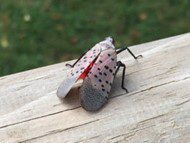What is a spotted lanternfly?
The spotted lanternfly, also known as lycorma delicatula, is a bothersome planthopper native to China, India, and Vietnam. They were discovered in the United States for the first time in 2014. They are commonly found in northern states, having a major impact on areas such as Connecticut, New York, and especially New Jersey. When not in flight, their forewings are greyish with black spots, and the wing tips display a network of veins. When they open their wings, their red and black hind wings and black and yellow abdomen are visible.
Life cycle of Spotted Lanternflies:
The spotted lanternfly takes less than a year to go from egg to full adult.
- Eggs hatch: Spotted lanternfly eggs look like masses of mud that have been smeared. These eggs begin to hatch in May all the way through June.
- Nymphs: Spotted lanternflies have four different nymph stages, which take place from June to July.
- Adult: Anywhere from June to December, spotted lanternflies are full grown and begin looking for mates.
- Laying eggs: They mainly lay eggs at the end of the summer, but this can happen through December.
It’s important to note that adults do not survive through the winter, which is why it is important to eliminate the eggs when found!
How Dangerous Are Spotted Lanternflies?


Reclaim your yard with the assistance of Mosquito Joe of Mid Central NJ:
Mosquito Joe is dedicated to restoring outdoor enjoyment, which is why we offer spotted lanternfly control services. Our trained and certified Mosquito Joe technicians will apply a one-time treatment to the trees that these harmful spotted lanternflies are feeding on, eradicating them and preventing their spread to additional plants and trees. If you require assistance exterminating Spotted Lanternflies, please contact us at 732-298-6559 or fill out a request form to get a free quote!


